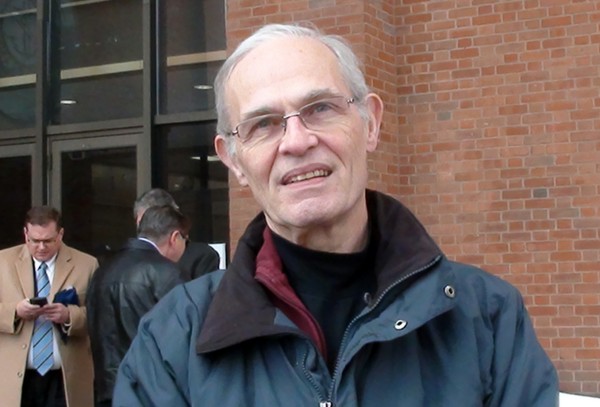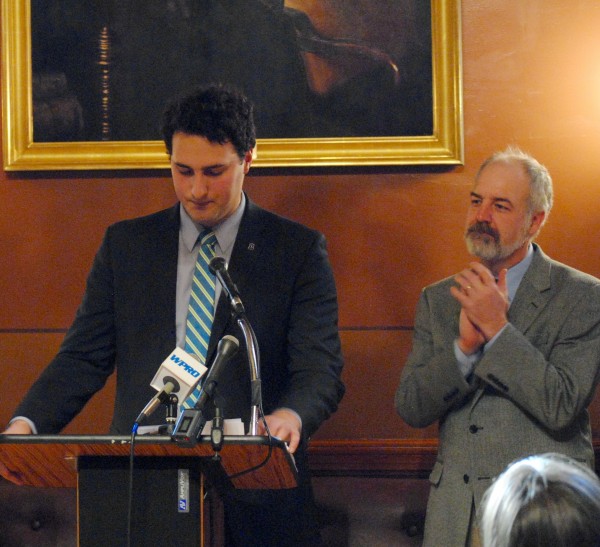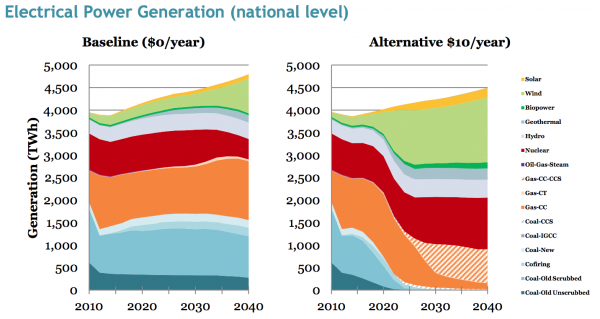
[The following is the testimony presented by Professor Peter Nightingale at the hearings for Energize RI’s carbon tax bill (H 7325) introduced by Representative Aaron Regunberg.]
I would like to thank the sponsors of the Energize RI Act for putting carbon tax on the table. This is important legislation, but I cannot support the bill in its current form.
My main objection is that the bill under-taxes natural gas by a factor of 5 to 10, precisely when a perfect fracked-gas storm is about to hit RI:
- The Raimondo administration is pushing for a one GW fracked-gas fired power plant in Burrillville.
- National Grid is asking the Federal Energy Regulatory Commission for a permit to build an LNG liquefaction facility at Fields Point.
The Office of Energy Resources will be in charge of large parts of the implementation of this bill. I know from conversations with people in that office that they do not understand that fracked gas is worse for the climate than coal and oil on the time scale that matters.
The Office of Energy Resources bases itself on federal numbers, but:
- EPA has systematically underestimated the amount of natural gas that escapes unburned.
- EPA fails to account properly for the fact that methane is a much more powerful greenhouse gas than carbon dioxide.
- Undoubtedly, these numbers also pollute the REMI study which, as a consequence is likely to overstate the greenhouse gas reduction that this bill will produce. [See also:
A study of pricing carbon pollution: reality or fiction?]
Indeed, “Methane Leaks Erase Climate Benefit Of Fracked Gas, Countless Studies Find,” was the tittle of a recent publication. This was sparked by a recent Harvard study that found an increase in U.S. methane emissions from 2002–2014. The increase was more than 30% from 2002-2014.
By under-taxing fugitive methane by roughly a factor ten, this bill unintentionally favors natural gas infrastructure development relative to fossil fuels with a smaller greenhouse gas potential. That is precisely the disaster that the Raimondo administration is planning in Burrillville.
Rhode Island cannot solve the emission problem by itself, but we should have a carbon tax bill that can be copied by other states. The Energize Rhode Island Act fails this test.
Please see my lack of support for the Energize RI Act as constructive criticism, and thanks again for your much appreciated efforts.
]]> New carbon pricing legislation, backed by the Energize RI coalition, was introduced by Representative Aaron Regunberg (D District 4 Providence) in the House chamber on Tuesday. The legislation “is designed to provide incentives for renewable energy use, encourage the development of cleaner renewable energy projects, and create local jobs.”
New carbon pricing legislation, backed by the Energize RI coalition, was introduced by Representative Aaron Regunberg (D District 4 Providence) in the House chamber on Tuesday. The legislation “is designed to provide incentives for renewable energy use, encourage the development of cleaner renewable energy projects, and create local jobs.”
“The legislation would establish a new Clean Energy and Jobs Fund that will invest in renewables and efficiency and help Rhode Islanders lower their energy costs,” said Energize RI in a press release, “The Fund will be financed by a fee on carbon pollution, beginning at $15 per ton of greenhouse gas emissions, paid by the companies that sell fossil fuels in the state.”
Traditionally, user fees hit members of low income communities hardest, but Douglas Hall, Director of Economic and Fiscal Policy at the Economic Progress Institute, said that this bill addresses that problem head on and to good effect. “This bill does a few things that we at the Economic Progress Institute think are important. A portion of the carbon tax will be passed onto consumers, including lower-income families, in the form of higher prices. The Energize Rhode Island Act addresses this concern, by providing rebates to Rhode Island families and businesses, ensuring they come out ahead. We have seen the incidence analysis of this bill and are confident that lower income Rhode Islanders will be more than protected from additional costs.”
Introducing the bill, Regunberg spoke about the economic, legal and moral responsibility Rhode Island has to take on such an “ambitious legislative proposal.”
“Economically, this is where the world is moving… Rhode Island can either be a follower, and get the least economic benefit from these trends, or we can be a leader for this country.
“Legally, in 2014 we passed the Resilient Rhode Island Act, which obligated our state to reach certain emission reduction goals. Right now we are not on track to reach those goals…
“And morally, we have a responsibility to Rhode Island’s young people, to my generation and to the generations that come after mine… by failing to enact significant climate legislation, we are condemning the babies who are born today at Women and Infants to a dangerous future.”
Small business owner Joseph Fernandes saw the issue from an economic point of view. “If you were to attempt to open a business today in many parts of our state, you would find yourself facing a whole new set of barriers that didn’t exist for my parents. You would be faced with the burden of having to pay for costly flood insurance premiums that will only grow higher. Climate change means your business is always vulnerable to an extreme weather event that could permanently close you down.”
The Energize RI Coalition sees their efforts as complementary to other state programs dealing with climate and energy. Ken Filarski of Filarski Architecture said the the clean energy sector of our economy is one of the fastest growing in the state. “This sector is already growing at a rate that is stronger than the rest of Rhode Island’s economy, supporting over 10,000 jobs and adding 1,600 more by the end of the year. Passing this legislation means more funds to install solar panels, insulate houses, and implement other energy efficiency measures. It means more Rhode Islanders working in a field that has proven itself to be both profitable and sustainable.”
More details from the press release:

“An economic impact study by Regional Economic Models, Inc. (REMI) estimated that the legislation would create a net growth of 1,000 to 2,000 new jobs in just the first two years of the program. It also noted that Rhode Island spends more than $3.1 billion annually on fossil fuels, nearly all of which flows out of the state, since Rhode Island does not produce these fuels itself. Incentivizing Rhode Islanders to switch from out-of-state fossil fuel sources to local renewables and efficiency will help keep more of that money in Rhode Island and protect the state from the volatile market swings that often affect these fuel prices.
“The legislation establishes that 25 percent of the fees collected for the Clean Energy and Jobs Fund would be used for climate resilience, energy efficiency, energy conservation, and renewable energy programs, to be administered by the state infrastructure bank created through legislation last year. Thirty percent would be used to provide direct dividends to employers in the state per full-time employee, and 40 percent would be used to provide direct dividends for every single state resident. Employees and residents would receive their funds via tax credits, or direct checks for those not required to file taxes.
“According to the coalition’s research based on average energy use data, the program will not increase energy costs for the average Rhode Island family and businesses In fact, by paving the way for a transition to an energy independent economy, the policy will reduce costs for all Rhode Islanders in the long term. In the short term, the average Rhode Island household receives a net gain from the rebate. Even higher-income households will have an average net cost of only $25 per year toward the Clean Energy and Jobs Fund.”
Energize RI is a coalition of advocates from business, environmental and faith communities. Speaking from a faith perspective was Beth Miham, a member of Channing Memorial Church in Newport and a former board member of Interfaith Power and Light for a number of years.
]]>![gigo_cartoon1[1]](http://www.rifuture.org/wp-content/uploads/gigo_cartoon11.jpg) Here are my impressions, based both on the talk and the report. Nystrom started with an overview of the plan, which can be found on CCL’s beautifully-organized web page:
Here are my impressions, based both on the talk and the report. Nystrom started with an overview of the plan, which can be found on CCL’s beautifully-organized web page:
- Place a steadily rising fee on carbon-based fuels
- Give all of the revenue from the carbon fee back to households
- Make border adjustments to ensure fairness and competition
- This will be good for the economy AND even better for the climate
Border adjustments is short for fees on products imported from countries without a carbon tax, along with rebates to US industries exporting to such countries. Such adjustments serve to level the playing field for international trade.
Based on model calculations, REMI*Synapse makes the following predictions about what implementation of this plan would look like nationally by 2025 by comparing projections with and without the Fee-and-Dividend carbon tax:
- 2.1 million more jobs
- 33% reduction in CO2 emissions
- 13,000 premature deaths saved from improvements in air quality
The fundamentals of the CCL model legislation are perfectly solid, namely that burning of fossil fuels is causing rising global temperatures and poses an imminent threat to the natural environment and an unacceptable risk of catastrophic impacts to human civilization. Also the principle of letting the polluters pay is sensible. The problem, as I see it, is the unsatisfactory implementation of these principles resulting from incomplete understanding of climate science.
The proposal is to put a fee on carbon pollution, but it fails to account for fugitive fracked gas leaking into the atmosphere at the well, from the pipelines or anyplace else down stream. Clearly, the study predates our current understanding of the effects of fracked gas. The unburnt gas that escapes in copious amounts is a much more powerful greenhouse gas than CO2. The net result over the next couple of decades is that conversion to natural gas, as called for in the President’s Climate Action Plan, is very likely to be more dangerous for the global climate than coal and oil.
The Fee-and-Dividend puts a price on CO2 while pollution by fugitive fracked gas continues merrily free of charge. Summing up the climate impact exclusively in terms of a reduction CO2 emissions, as the REMI*Synapse study does, is simply wrong.
Similar criticism applies to the reduction by 13,000 of premature deaths that will result from near-absence of pollution caused by coal fired power plants. The effect of the poisoning of air and water due to fracking are very difficult to quantify with our current understanding.
What we do know does not look good; we are waist deep in the big muddy of an uncontrolled fracking experiment with public health. Notice that we’re not even talking about the effects of the nuclear power generation featured prominently in the study. I guess that the study also manages to suspend the possible health impacts of climate change.
If you can temporarily suspend your disbelief, follow me on to the prediction about power generation. Let’s look at the following figure lifted from the REMI*Synapse study. The figure compares power generation with and without Fee-and-Dividend Carbon tax. The impact on total power generation even as far into the future as 2040 is small. By that time, according to the study, roughly half of the power will be green. The other half will be a a toxic mix of fossil fuel and nuclear energy. The plan will be essentially phase out coal, and the share of nuclear energy will double nationally. Renewable energy increases by about a third relative to the no-fee baseline.

The talk left some of us wondering why the South is projected to have only a minuscule fraction of power generated by wind and solar, while there is a big chunk of nuclear power. Compared this to a proposal by the Solutions Project, a plan for how the world can transition to 100% renewable energy based exclusively on wind, water and sun, with no nuclear power whatsoever.
Time to wrap up. As mentioned, the REMI*Synapse study of pricing carbon emissions fails to price fugitive methane. The results might be interesting for some, but they have no relevance for the world we live in. Computational science has a phrase for such studies: garbage in, garbage out. Of course, this particular problem could be addressed by redoing the study and incorporating our current insights, but there is a more fundamental problem. The study seeks exclusively for market driven solutions. Those proposed by the Solutions Project are simply not in the realm of possible outcomes of any study that take the rules of predator capitalism for granted.
The good people of CCL may think that they have to speak the language of the ruling class to get its attention and they may have a point. It’s not my style, but as long as they do not really hope to get what they seem to wish for, they have my blessing. After all, we’re in this together, and to change everything, we need everyone.
]]>